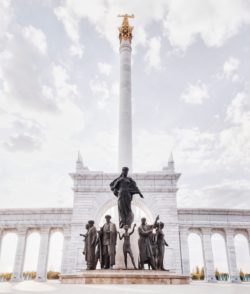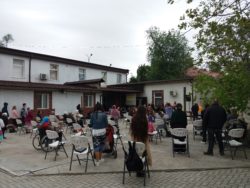Bakhid labors in a protected region in Kazakhstan. Recently, he traveled over 600 miles to the funeral of a church member who passed away. He writes of the current situation in Kazakhstan regarding the pandemic and ongoing difficulties in living as a Christian in this country:
In recent weeks, my country has experienced an increase in the number of COVID-19 cases. Hospitals are to the point of being overrun. Medicine is in short supply. The government is trying to alleviate fear by keeping panic to a minimum despite the facts every individual must face. One sister, “Dasha”, recently died because of COVID-19. Her death was very unexpected. She had some of the common symptoms: shortness of breath, tiredness, etc. She went to the hospital for testing and was treated briefly but was eventually released. With counsel from myself and others, she went back to the hospital to insist on more treatment. Here, she received intramuscular injections to help with her symptoms. These hospital visits, however, were not sufficient to save her life. One sister called an ambulance for Dasha late one night, but because of the high volume of calls in recent weeks, the ambulance was unable to respond to this urgent call for help. By the next morning, the sister who called for the ambulance called to inform me of Dasha’s death.
The news of her death under such tragic circumstances caused great sadness within the church. In addition to the distress of her death, trying to bury her in a Christian way proved impossible. Kazakhstan is a predominantly Muslim country to the point that everyone is assumed to be nominally Muslim. Therefore, after death, each person is expected to be buried in a Muslim fashion regardless of his or her views while they were alive. This was the case with Dasha. She did not define her wishes for burial in her will, so her family insisted on a traditional, non-Christian burial. Such Muslim burials are expected not only because of religious association but also for the fear of people and love of the glory of man. This same expectation was set by Dasha’s family and her former village.
Despite this discouraging news of Dasha’s death and the difficult reality of her non-Christian burial, I felt it was important to travel with her body to attend the service. I spoke with her family about a Christian burial, but because of the pressure from the outside, they would not consent. The Lord, however, still used my attendance at the funeral. My wife and I were able to share the good news of the gospel with several individuals who we met along the way. I was fearful going in to such a context with many opposed to me because I was Christian, but the Lord allowed us to be there and used our presence to spread the truth to those who probably had not yet heard of Christ.
- Please pray for these conversations and for Dasha’s family to consider what they heard concerning the one true God.
- Ask God to bring them to a saving knowledge of Him.
- Many expressed interest in attending our church, so pray that they would come.



